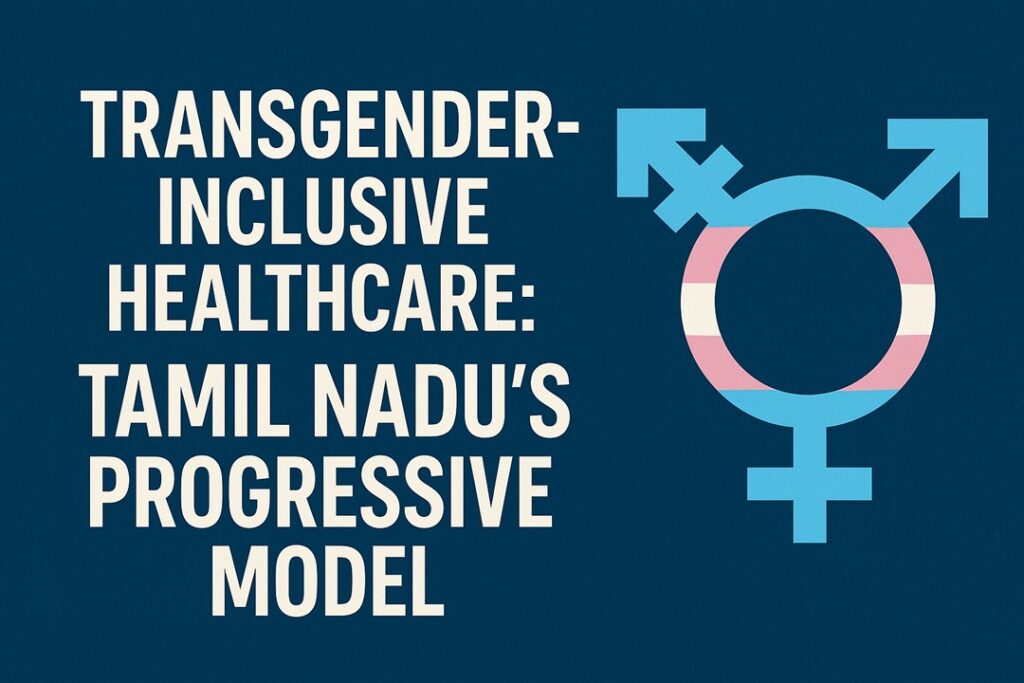Transgender-Inclusive Healthcare: Tamil Nadu’s Progressive Model

Context
Recently, the welfare of transgender persons has gained national attention, with Tamil Nadu emerging as a model State due to its progressive schemes, legal reforms, and inclusive healthcare initiatives.
Why Do Transgender Persons Face Healthcare Barriers?
Lack of trained professionals
Few healthcare providers are adequately trained in transgender health. Most focus solely on sexually transmitted infections or gender-affirming surgeries, overlooking the holistic, lifelong healthcare needs of the community.
Systemic exclusion
Exclusion from education, housing, employment, and social protection leaves many transgender persons without stable income or health insurance, deepening their vulnerability.
Stigma and discrimination
Hostile attitudes in healthcare settings erode trust and discourage timely medical care.
Poor awareness
Low awareness among the public and healthcare professionals leads to delays or avoidance of medical attention by many transgender persons.
What Has Tamil Nadu Done?
Pioneer in transgender-inclusive care
Since 2008, the Rajiv Gandhi Government General Hospital in Chennai has offered gender-affirming surgeries, supported by India’s first Transgender Welfare Board—long before the 2019 Transgender Persons Act mandated such services nationwide.
Gender Guidance Clinics (GGCs)
The National Health Mission established GGCs in 2018 to provide multidisciplinary care under one roof.
By 2025, eight districts host GGCs offering free gender-affirming procedures, with 7,644 transgender persons accessing services between April 2019 and March 2024.
Respectful and accessible environment
Posters in Tamil and English inside GGCs emphasise non-discrimination, privacy, inclusion, and confidentiality.
How Has Tamil Nadu Expanded Insurance Coverage?
Integration of treatments
In 2022, gender-affirming surgeries and hormonal therapy were integrated into the CMCHIS-PMJAY scheme under a five-year policy (2022–27), making India the first South Asian country to include transgender care in universal health coverage.
Advanced implementation
Tamil Nadu’s implementation of PMJAY-Ayushman Bharat TG Plus is more advanced than other States, now in its fourth year.
Removal of income cap
The State removed the ₹72,000 annual income cap for CMCHIS-PMJAY enrolment, increasing accessibility.
Addressing structural barriers
The mandatory ration card requirement showing the transgender person’s name was waived, acknowledging exclusion due to stigma and family rejection.
Coverage statistics
According to an upcoming WHO case study (October 2025), more than 5,200 transgender persons are enrolled, and over 600 have undergone gender-affirming surgeries or hormone therapy in 12 empanelled hospitals.
The scheme has disbursed ₹43.8 million, preventing financial hardship for many.
How Have Policy and Legal Reforms Strengthened This Model?
Legal framework
Section 15 of the 2019 Transgender Persons Act mandates comprehensive healthcare; Tamil Nadu has actively operationalised this.
Policy-driven training
In October 2024, doctors from GGCs were trained on the WPATH Standards of Care (Version 8) through collaborations with NGOs and LGBTQIA+ networks.
Judicial support
The Madras High Court has bolstered transgender rights in areas such as marriage, curriculum reform, banning conversion therapy and intersex surgeries, reopening GGCs after COVID, and combating police harassment.
State policies
The 2019 Mental Health Care Policy and the 2025 State Policy for Transgender Persons further strengthen rights in healthcare, education, and property.
Why Does Tamil Nadu Stand Out?
International recognition
A study by UNU-IIGH highlights Tamil Nadu’s enabling environment for GGCs, built through decades of reform.
Long-standing social reform
The State has historically championed social equity, challenging caste and gender hierarchies.
Cultural recognition
From the centuries-old Koovagam Kuthandavar festival to the 2022 government gazette adopting respectful Tamil terminology, social acceptance has deep roots.
Bipartisan political support
Despite political competition, major parties have consistently advanced transgender welfare initiatives.
What Challenges Remain?
GGCs need capacity expansion to offer comprehensive care across all levels, produce a dedicated health manual, and continuously train and monitor healthcare providers.
Stronger regulation of empanelled hospitals, inclusion of mental health services, grievance redress systems, and more research are essential.
Tackling societal bias will require cross-sectoral efforts, and active involvement of transgender communities at every stage of policy design and implementation remains crucial.
Conclusion
Tamil Nadu presents a promising and nationally relevant model for transgender-inclusive healthcare. However, only sustained political, social, and administrative commitment—paired with community engagement—can ensure long-term equity and dignity for transgender persons across India.
Source :The Hindu
